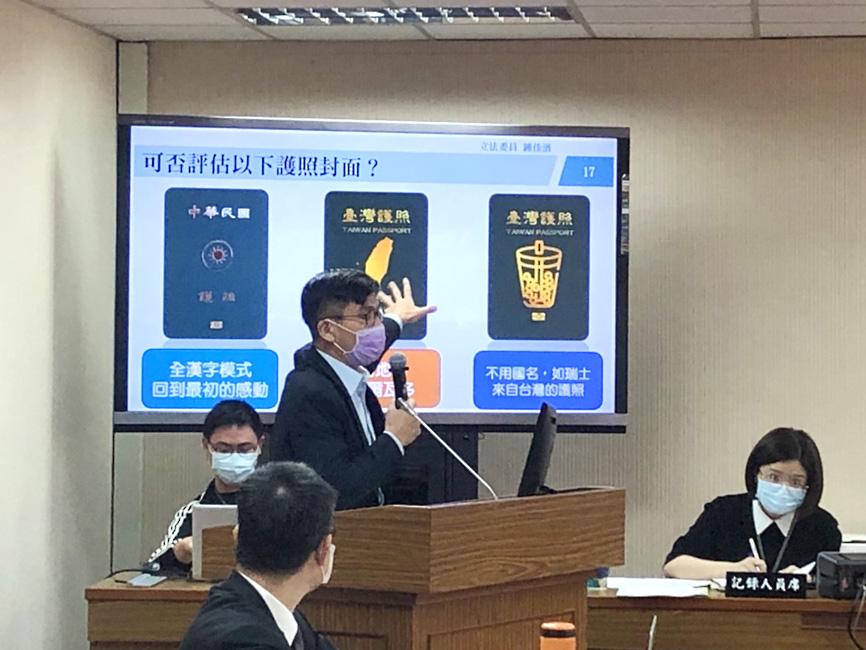Democratic Progressive Party Legislator Chung Chia-pin (鍾佳濱) yesterday unveiled three design proposals for a revised passport cover, at a meeting of the Legislative Yuan’s Foreign Affairs and National Defense Committee in Taipei.
The proposals were in response to a debate about whether to emphasize “Taiwan” and de-emphasize “China” in the wording on the cover.
Chung proposed designs including one with no English wording at all, which keeps the overall design of the current passport.

Photo: Lu Yi-hsuan, Taipei Times
Another replaced the national emblem with a map of the main island of Taiwan, and had the words “Taiwan Passport” in large lettering at the top and “Republic of China” in smaller lettering at the bottom, both in Chinese and English.
A third design replaced the national emblem with an image of a cup of bubble tea and had only the words “Taiwan Passport” in Chinese and English.
During the meeting, which was attended by officials from the Ministry of Foreign Affairs, Chung said that the use of the word “China” on the passport had caused problems for Taiwanese traveling abroad, as they have been mistaken for Chinese nationals.
Asked whether the Bureau of Consular Affairs had received any complaints about the current passport, bureau Director-General Phoebe Yeh (葉非比) said that the bureau receives about 10 complaints per year.
Neither the National Emblem Act (中華民國國徽國旗法), nor the Enforcement Rules of the Passport Act (護照條例施行細則) stipulate that the passport must display the national emblem, Chung said.
However, the Enforcement Rules of the Passport Act does prohibit individual passport owners from modifying the graphics in their passports or adding new graphics without authorization, he added.
Asked whether the ministry has the authority to change the cover of the passport, Deputy Minister of Foreign Affairs Hsu Szu-chien (徐斯儉) said: “That should be the case.”
Chung said that there was no need to have the nation’s name written in English or a national symbol on the cover of the passport, citing examples from countries like Germany and Switzerland, which have English only for the word “passport,” and France, which has no English on its passport cover at all.
Similarly, the Salvadorean passport has only Spanish on its cover and a map of the region, and the Republic of Guinea passport has only French and the emblem for the Economic Community of West African States, of which it is a member, he said.
Of the 156 non-English-speaking countries worldwide, 71 do not display English-language names for their countries on their passport covers, Chung said, adding that the nation’s earliest passports had only Chinese characters on their covers.
Changing the passport design would require public consensus, Hsu said.
Responding to a comment by Chung that passports could be revised any year, as the ministry needs to print new passports annually, Yeh said that the ministry still has 600,000 passports left over from last year, as people are not traveling because of the COVID-19 pandemic.

Chinese spouse and influencer Guan Guan’s (關關) residency permit has been revoked for repeatedly posting pro-China videos that threaten national security, the National Immigration Agency confirmed today. Guan Guan has said many controversial statements in her videos posted to Douyin (抖音), including “the red flag will soon be painted all over Taiwan” and “Taiwan is an inseparable part of China,” and expressing hope for expedited reunification. The agency last year received multiple reports alleging that Guan Guan had advocated for armed reunification. After verifying the reports, the agency last month issued a notice requiring her to appear and explain her actions. Guan

The Kaohsiung Tourism Bureau audited six hotels in an effort to prevent price gouging ahead of Korean band BTS’ concert tour in the city scheduled for Nov. 19, 21 and 22 this year. The bureau on Friday said that the audits — conducted in response to allegations of unfair pricing posted on social media — found no wrongdoing. These establishments included the local branches of Chateau de Chine, Hotel Nikko, My Humble House, and Grand Hai Lai, it said, adding that the Consumer Protection Commission would have penalized price gougers had the accusations been substantiated. The bureau said the Tourism Development Act

BACK TO WINTER: A strong continental cold air mass would move south on Tuesday next week, bringing colder temperatures to northern and central Taiwan A tropical depression east of the Philippines could soon be upgraded to be the first tropical storm of this year, the Central Weather Administration (CWA) said yesterday, adding that the next cold air mass is forecast to arrive on Monday next week. CWA forecaster Cheng Jie-ren (鄭傑仁) said the first tropical depression of this year is over waters east of the Philippines, about 1,867km southeast of Oluanpi (鵝鑾鼻), and could strengthen into Tropical Storm Nokaen by early today. The system is moving slowly from northwest to north, and is expected to remain east of the Philippines with little chance of affecting Taiwan,

The military yesterday said it has located the flight data recorder, or black box, of an F-16V jet that disappeared off eastern Taiwan earlier this month, and it would soon deploy a salvage team to try to retrieve it. Air Force Command Headquarters said that while it had pinned down the location of the black box, it was still searching for the aircraft’s sole pilot, air force Captain Hsin Po-yi (辛柏毅). Without providing details, the air force said it had located the black box days after detecting some intermittent signals and would now engage a team of professionals to retrieve it. The air